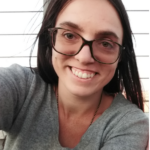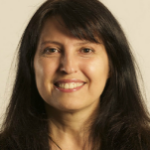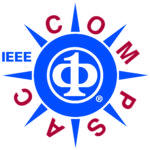Thursday 6/29
3:30 – 5:00pm
Location: F2
Roundtable Discussion: The Role of Digital Humanities in the Education Scenario
In this roundtable, we explore Digital Humanities (DH) in the educational landscape. DH fosters interdisciplinary collaboration among educators, researchers, and students. DH also promotes critical thinking, problem-solving, and digital literacy skills. We also explore the ethical and inclusive dimensions of DH, addressing challenges and opportunities.
Panel Moderator:
 Andrea Balbo (1970) is full professor of Latin language and literature at the Department of Humanities of the University of Turin and teaches Latin language and literature at the Università della Svizzera italiana in Lugano. His research focuses on the following topics: Roman oratory and declamation of the imperial age; Cicero, Seneca, historians and late antique writers (Ausonius, Macrobius, Rutilius Namatianus); reception of Greek and Latin authors: relationship between ancient Eastern and Western thought; history of classical philology; neo-Latin authors; Latin language and literature teaching methods with particular attention to multimedia applications and to digital humanities . He is director of CIRDA (Inter-departmental Center for Educational Research of the University of Turin) and directs with C. O. Tommasi the SERICA (Sino-European Religious Intersections in Central Asia. Interactive Texts and Intelligent Networks) project funded by FISR 2019. He is the dean of the course of Language Technologies and Digital Humanities at UniTO and participates actively to project Compiti@Casa.
Andrea Balbo (1970) is full professor of Latin language and literature at the Department of Humanities of the University of Turin and teaches Latin language and literature at the Università della Svizzera italiana in Lugano. His research focuses on the following topics: Roman oratory and declamation of the imperial age; Cicero, Seneca, historians and late antique writers (Ausonius, Macrobius, Rutilius Namatianus); reception of Greek and Latin authors: relationship between ancient Eastern and Western thought; history of classical philology; neo-Latin authors; Latin language and literature teaching methods with particular attention to multimedia applications and to digital humanities . He is director of CIRDA (Inter-departmental Center for Educational Research of the University of Turin) and directs with C. O. Tommasi the SERICA (Sino-European Religious Intersections in Central Asia. Interactive Texts and Intelligent Networks) project funded by FISR 2019. He is the dean of the course of Language Technologies and Digital Humanities at UniTO and participates actively to project Compiti@Casa.
Panelists:
Elisa Corino
 Mélanie Lucciano (PhD in Latin literature, Paris-Sorbonne & Università degli studi di Torino 2013) is Maîtresse de conférences at Université de Rouen-Normandie since 2016. She is involved in the management of the Master in Digital Humanities of Rouen since its creation in 2017. The Master’s degree comprises two programmes (Digital Editions, Humanities and Digital Mediation): https://mhnurouen.hypotheses.org/. Together with Prof. Séverine Tarantino and Dr. Charlotte Tournier, she organized a workshop in 2017 at Université de Lille “Enseigner les langues anciennes à l’ère digitale : apprendre par et pour les Humanités numériques ?” (https://talie.hypotheses.org/42).
Mélanie Lucciano (PhD in Latin literature, Paris-Sorbonne & Università degli studi di Torino 2013) is Maîtresse de conférences at Université de Rouen-Normandie since 2016. She is involved in the management of the Master in Digital Humanities of Rouen since its creation in 2017. The Master’s degree comprises two programmes (Digital Editions, Humanities and Digital Mediation): https://mhnurouen.hypotheses.org/. Together with Prof. Séverine Tarantino and Dr. Charlotte Tournier, she organized a workshop in 2017 at Université de Lille “Enseigner les langues anciennes à l’ère digitale : apprendre par et pour les Humanités numériques ?” (https://talie.hypotheses.org/42).
 Professor Tiziana Margaria is Chair of Software Systems at the Dept. of Computer Science and Information Systems at the University of Limerick. She has broad experience in the use of formal methods for high assurance systems, in particular concerning functional verification, reliability, and compliance of complex heterogeneous systems. Current application domains are to embedded systems, healthcare, and smart advanced manufacturing. She is a principal investigator of Lero, the Irish research centre on Software, Confirm, the Irish national Research Centre on Smart Manufacturing, of LDCRC, the Limerick Digital Cancer Research Centre, and co-director of the SFI Centre of Research Training in AI. Her most recent achievement is R@ISE, a 5 years Strategic Partnership Program on Low-code/No-code software development for high assurance systems. which is a tightly knit ecosystem spanning education, industrial practice and research. In the Digital Humanities, she has been part of the DBDIrl 1864-1922 IRC laureate award, for which she has won the University of Limerick Team Teaching award with historians Prof Ciara Breathnach and Dr. Rachel Murphy. She is Vicepresident of the Irish Computer Society and of IFIP WG10.5.
Professor Tiziana Margaria is Chair of Software Systems at the Dept. of Computer Science and Information Systems at the University of Limerick. She has broad experience in the use of formal methods for high assurance systems, in particular concerning functional verification, reliability, and compliance of complex heterogeneous systems. Current application domains are to embedded systems, healthcare, and smart advanced manufacturing. She is a principal investigator of Lero, the Irish research centre on Software, Confirm, the Irish national Research Centre on Smart Manufacturing, of LDCRC, the Limerick Digital Cancer Research Centre, and co-director of the SFI Centre of Research Training in AI. Her most recent achievement is R@ISE, a 5 years Strategic Partnership Program on Low-code/No-code software development for high assurance systems. which is a tightly knit ecosystem spanning education, industrial practice and research. In the Digital Humanities, she has been part of the DBDIrl 1864-1922 IRC laureate award, for which she has won the University of Limerick Team Teaching award with historians Prof Ciara Breathnach and Dr. Rachel Murphy. She is Vicepresident of the Irish Computer Society and of IFIP WG10.5.
 Veronica Orazi (Florence, 1966), Coordinator of the University of Turin branch of the PhD in Digital Humanities. Digital technologies, arts, languages, cultures, and communication, in partnership with the University of Genoa. PhD in Ibero-romance Philology, Full Professor of Spanish Literature and Catalan Language and Literature at the University of Turin, previously at the Universities “Ca’ Foscari” of Venice, Bolonia and Siena.President of the Quality and Evaluation Board of the UNITA European University, she has been President of the Quality Assurance Board of the University of Turin. Coordinator for the University of Turin of Spoke 3 – Digital Libraries Archives and Philology of PNRR PE5. Expert evaluator for ANVUR – National Agency for the Evaluation of Universities and Research; Evaluator/Reviewer for CORDIS – Community Research and Development Information Service, of the European Commission; she has been a Remote Referee of the ERC Grants Panel SH5 Culture and Cultural Production, of the European Research Council. Viting Professor at the Universities of Leipzig, Barcelona and Alicante, her research interests focus on medieval and contemporary Spanish and Catalan literatures, as well as on literary translation.
Veronica Orazi (Florence, 1966), Coordinator of the University of Turin branch of the PhD in Digital Humanities. Digital technologies, arts, languages, cultures, and communication, in partnership with the University of Genoa. PhD in Ibero-romance Philology, Full Professor of Spanish Literature and Catalan Language and Literature at the University of Turin, previously at the Universities “Ca’ Foscari” of Venice, Bolonia and Siena.President of the Quality and Evaluation Board of the UNITA European University, she has been President of the Quality Assurance Board of the University of Turin. Coordinator for the University of Turin of Spoke 3 – Digital Libraries Archives and Philology of PNRR PE5. Expert evaluator for ANVUR – National Agency for the Evaluation of Universities and Research; Evaluator/Reviewer for CORDIS – Community Research and Development Information Service, of the European Commission; she has been a Remote Referee of the ERC Grants Panel SH5 Culture and Cultural Production, of the European Research Council. Viting Professor at the Universities of Leipzig, Barcelona and Alicante, her research interests focus on medieval and contemporary Spanish and Catalan literatures, as well as on literary translation.
 Born in Genoa (Italy) in 1962, Gianni Vercelli is Associated Professor of Computer Engineering at the University of Genoa. In 1987 he received the magna cum laude degree in Electronic Engineering, with AICA Award for Best Italian Master Thesis in Computer Science. and in 1992 he received a Ph.D. in Computer Science; he joined the University of Trieste as Assistant Professor in 1996, then he came back at University of Genoa. In 1988 he founded the TAU software house – Men’s Automation Technology. From 1999 to 2002 he was director of the Master in Multimedia Technologies for Distance Education at the same university, where since 2003 he has taught the University Master in e-Learning for School, University and Business, and has been scientific manager in national and international projects on web, AI, Robotics, VR/Metaverse and assistive technologies.
Born in Genoa (Italy) in 1962, Gianni Vercelli is Associated Professor of Computer Engineering at the University of Genoa. In 1987 he received the magna cum laude degree in Electronic Engineering, with AICA Award for Best Italian Master Thesis in Computer Science. and in 1992 he received a Ph.D. in Computer Science; he joined the University of Trieste as Assistant Professor in 1996, then he came back at University of Genoa. In 1988 he founded the TAU software house – Men’s Automation Technology. From 1999 to 2002 he was director of the Master in Multimedia Technologies for Distance Education at the same university, where since 2003 he has taught the University Master in e-Learning for School, University and Business, and has been scientific manager in national and international projects on web, AI, Robotics, VR/Metaverse and assistive technologies.
Member of IEEE Computer, RAS & Education Societies, he was one of the founders of the AI & e-Learning working groups of AI*IA and SI-EL. His scientific interests are currently focused on Technology Enhanced Learning, Semantic Web, Digital Humanities, Virtual/Extended Reality, Robotics and Assistive Technologies, Artificial Intelligence and Machine Learning applied to Health, Disability and Learning, with more than 100 publications in these fields. He is director for the 3DLabFactory Laboratory, working for years on research activities at the Savona Campus as scientific responsible for international and national research projects. He is co-owner of a patent of a robotic virtual/physical simulator for video-laparoscopic surgery, and co-founder of a start-up company which is working on drone swarms. He is from 2011 the delegate of the University of Genoa to the ITS-ICT Accademia Digitale Foundation, and from 2020 he has been appointed president of CeDIA, the ICT Centre of the University of Genoa.

